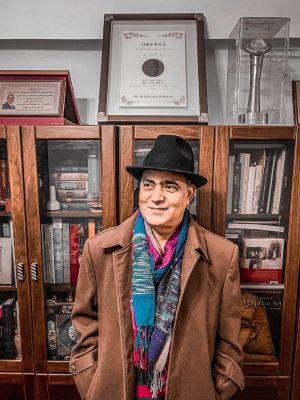
Interview by Michaael Adeboboye, Editor in Chief, CAJ International Magazine
Coming to the pen profession, Ashraf Aboul-Yazid (Ashraf Dali) is more or less a demigod. The Benha born Egyptian poet and novelist is an award winning journalist. He is also a founding member of the Congress of African Journalists (CAJ). His passion for writing and travels have earned him a global portrait permeating the globe. Ashraf has the network and the people that matter to what he knows to do best. In this interview with Michaael Adeboboye, Ashraf unveils many interesting issues starting from his childhood, passion for poetry, new works and more.
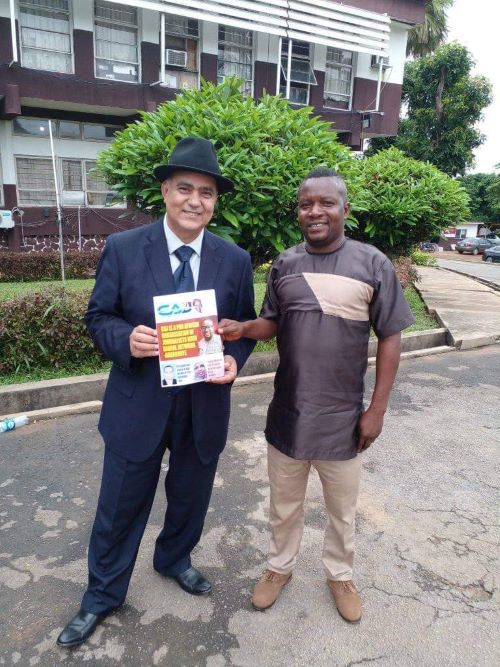
Excerpts:
- Ashraf Aboul-Yazid (Ashraf Dali) is a poet, writer and journalist. We have known this very well, but give us insight to your backgrounds.
In the beginning, there was the influence of poetic music in the primary school classes. The magic fell on both my ears and heart. I felt that the poetic statement was more valuable than other words. This feeling became deeper with the realization of the essence of poetry itself, and I went to it when I was reciting poetry on the school radio, so I linked the patriotic poems with their echo. In order to incite public enthusiasm, despite this, I did not begin writing national poetry, and that was at the end of primary school. Rather, I wrote romantic poems to my teachers, and later to my colleagues and neighbors. I felt – at that time – that addressing a woman, and even talking about her, must be in poetry! I even wrote poems on school composition topics, or so I thought, with the encouragement of my teacher!
As for his cultural references, they are many: studying the Holy Qur’an in the first grade of primary school in an Azhar school was like a lesson to love for the Arabic language. Then I moved to a school with a huge, ideal library, and I read all of its books without distinction. I had an exemplary voraciousness for reading, and then my relationship with cultural magazines began; such as Al-Hilal, Al-Kateb, Al-Majalla, and others, were my first specialized reading stations.
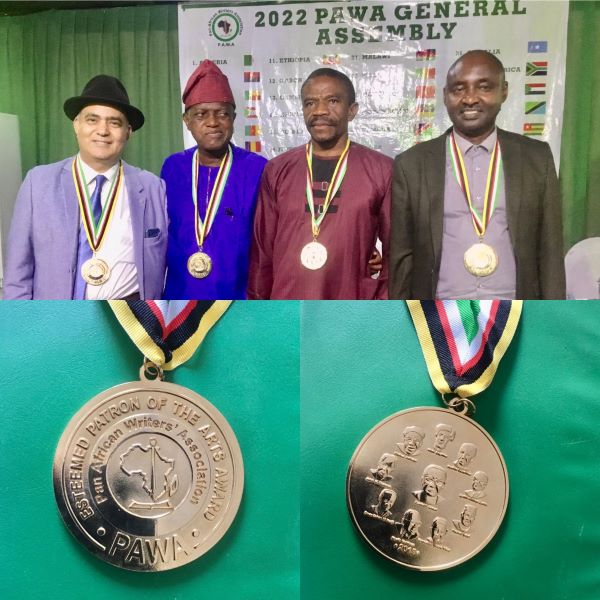
I also used to sneak into adult public libraries when I was in the fifth grade or later to bury myself between the covers of a book about civilization, history, science, or art and literature, of course. Therefore, my first relationship with poetry was closely related to my relationship with drawing, and practicing them together. When I studied English literature, the poems of T.S. Eliot, Ezra Pound, and W. H. Auden, after Coleridge, Wordsworth, and others, was real sparks for the question of poetry. The English language was my means of moving further in the search for poetry, not only in English literature but in other literatures – in China, Japan, the Soviet Union and African countries – through the English versions of literary periodicals in those countries. When I published a literary magazine – that lasted for 5 years, starting in 1983 – I had the opportunity from then until now, while I am still working in literary journalism, to be among the touchstones of getting to know educated figures, which undoubtedly benefited me greatly.
- What was it like to be born in Benha and memories of growing up?
Benha, my birthplace, is a small city that served as the capital of Qalyubia Governorate, and is located fifty kilometers north of the Egyptian capital. Cairo, but it had all for me; the good school, the ideal library, the River Nile, and calm atmosphere. Now Benha changed a lot, but still keeps the early memories:
Benha
As a tit on the River Nile’s breast
Benha sleeps, and pours
Its honey in my dreams.
I wonder, when I come home
If I could remember all its roads?
Or if Benha remembers my face
With the new tired roads
Engraved on it?
- How did you start the Silk Road Literature and what has that offered you?
After a journey in cultural work, I thought of creating the Silk Road Literature Series. I had published an Arabic encyclopedia in the Bibliotheca Alexandrina about (The Silk Road), its kingdoms, iconic figures, and its cultures, so I thought about the creative Silk Road, and publishing, whether by authorship or translation, books that present this cultural diversity.
I consider myself a builder of cultural bridges, and the most important publication was the poetry anthology series. The Silk Road Anthology, where the poems of hundreds of poets around the world were published within the framework of specific themes. The previous themes of the Anthology Editions were “Asia Sings”, “Mediterranean Waves”, “Ancient Egyptians, Modern Poets”, and “Arabian Nights, World Poems”. The Anthology has been seeking bridging ideas and creative people. The most recent one was “Nano Poems for Africa”.
- What actually informed your decision of being a poet?
A poet is born with a gift, and I decided to take care of this gift.
- Could you tell us about what journalism has offered you and the challenges?
When I was young, I loved to correspond with the youth of the world, and I used to send letters. My letters were designed and illustrated in the form of magazines in the name of those I write to them. I also used to draw pages and type over them with a typewriter. I think journalism has been in my blood.
During my university years, I chose to publish a literary magazine, within the informal press stream, and then I moved between the largest magazines in the Arab world, in Egypt (Adab – wa – Naqd), the Sultanate of Oman (Nizwa), Kuwait (Al Arabi), and now in Korea (Magazine N), and our magazine in Nigeria (CAJ IM).
The challenge was to keep readers, and avoid falling in fatal mistakes of fake news and recycled journalism. It is a long story to survive in our time.
- You have received many awards on your work. Tell us about this and which is the most precious to you?
My main awards were the Man of Culture for the Year, Tatarstan (2012), the Arab Journalism Award in , UAE (2015), The Gold Medal in LIFFT Eurasian Literary Festival, Istanbul (2021), The Medal of Esteemed Patron of Arts, PAWA, Ibadan (2022), the Medal of Honor, International Commonwealth of Peoples’ Diplomacy (МСНД), Kazakhstan (2022), Sawiris Cultural Award for Children Literature, Cairo (2023), and the Medal of Sultan Baybrus, International Commonwealth of Peoples’ Diplomacy (МСНД), Kazakhstan (2023), but the most precious to me has been Manhae Grand Prize in Literature , The Republic of Korea (2014), not only for its value, but it is an award given before to Nelson Mandela in peace and Wole Soyinka in literature, and I am the only Arab African to win this prestigious award in literature.
- You have travelled to many African countries. What are the differences you see between the Northern African countries and the rest of the regions?
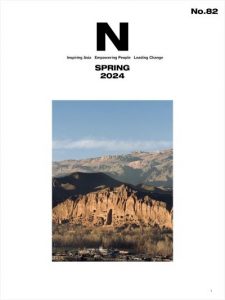
It is not about North and South, but rather it goes beyond all of that to culture and history. All of Africa’s countries suffered from colonialism, but there are those who transcended that and chose cultural and historical independence. There are those who hold the stick from the middle, and there are those who are reconciled with their past history and are making progress.
Perhaps the difference today is the shift from the tribal system to the state, which is important. I have visited the north, south and center of the continent as well, and we still need a lot to say that we are a strong, great, independent Africa.
But if I talk to you about architecture, food and fashion, there are definitely differences, but traveling makes you accept and appreciate that.
- Presently, Africa is going through so many challenges, especially in the economy and security . How have these challenges affecting the work of Writers?
The effect is great. Because there is no dynamism without freedom of movement and safe movement between borders, which is hindered by the current circumstances.
For example, we- journalists – need international passports to enable us moving freely in search of the truth with protection, and creative people, whether historians, poets or novelists, need to fly safely under more than one sky.
In order to visit Nigeria, as an African citizen coming to an African country, there are huge visa costs and application’s difficulties that are not easy for everyone to afford.
- Could tell us about your new works?
My new collection (Poems), a Poetry Anthology (1989 – 2024), which includes poems from my first collection, “The Whisper of the Sea (1989), and the second, “The Shells.” (1996), the third is “The Memory of Silence” (2000), the fourth is “On the Path of Death” (2001), and the fifth is “The Memory of Butterflies” (2004), in addition to selections from two collections published previously in English, namely “The Maps of Mirage” (2013), and “The Monk on the gray mountaintop ” (2023). My poem “The Monk on the gray mountaintop” was written down in its final form on my sixtieth birthday, so I included it in the poetry collection. It comes in an appendix of 20 languages.
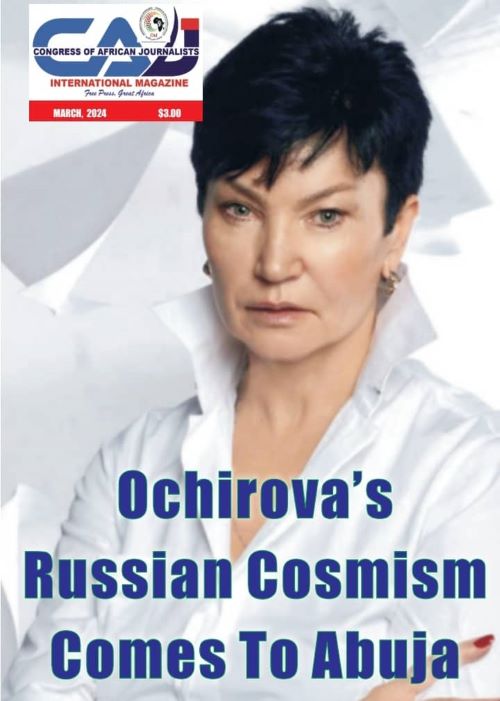
- The World Organization of Writers (WOW) first congress will be holding in Abuja, Nigeria in April. You as a member, can you tell us what the WOW goals for the Congress are?
Margarita Al, President of the World Writers’ Organization, had it precisely; the main goals of WOW is uniting the creative efforts of the world’s writers in the interests of the future of the humanitarian sphere, ensuring the decisive role of culture, literature and moral values in maintaining stability in the world.
- Apart from being the President of Association of Asia Journalists (AJA), you are also a founding member of Congress of African Journalists (CAJ) that publishes CAJ International Magazine, so far how would you rate the magazine in terms of its coverage and contents?
Loyalty is the foundation of success, and commitment is the basic of continuity. We need everyone to be Michael and Ashraf in their loyalty and commitment. We want the project that is revived by the presence of individuals to turn into institutional work, so that we can find those to complete our path and maintain our goals with the integrity of the profession of free and true journalism in Africa.
_______________